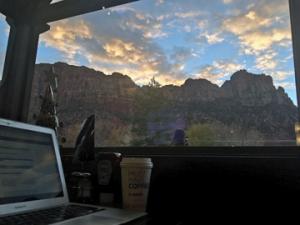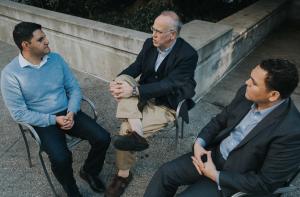Recently, I have been posting excerpts (Part 1, Part 2) from a fascinating article by Dorothy Sayers entitled “Why Work?” To review, here are Sayers’ first two propositions:
The first [proposition], stated quite briefly, is that work is not, primarily, a thing one does to live, but the thing one lives to do. It is, or it should be, the full expression of the worker’s faculties, the thing in which he finds spiritual, mental and bodily satisfaction, and the medium in which he offers himself to God. . . . .
My second proposition directly concerns Christian as such, and it is this. It is the business of the Church to recognize that the secular vocation, as such, is sacred. Christian people, and particularly perhaps the Christian clergy, must get it firmly into their heads that when a man or woman is called to a particular job of secular work, that is as true a vocation as though he or she were called to specifically religious work.

Today, I’ll post her third (and last proposition), along with some of her supporting statements.
This brings me to my third proposition; and this may sound to you the most revolutionary of all. It is this: the worker’s first duty is to serve the work. The popular catchphrase of today is that it is everybody’s duty to serve the community, but there is a catch in it. It is the old catch about the two great commandments. “Love God – and your neighbor: on those two commandments hang all the Law and the Prophets.”
The catch in it, which nowadays the world has largely forgotten, is that the second commandment depends upon the first, and that without the first, it is a delusion and a snare. Much of our present trouble and disillusionment have come from putting the second commandment before the first.
Sayers adds:
The only true way of serving the community is to be truly in sympathy with the community, to be oneself part of the community and then to serve the work without giving the community another thought. Then the work will endure, because it will be true to itself. It is the work that serves the community; the business of the worker is to serve the work.
Where we have become confused is in mixing up the ends to which our work is put with the way in which the work is done. The end of the work will be decided by our religious outlook: as we are so we make. It is the business of religion to make us Christian people, and then our work will naturally be turned to Christian ends, because our work is the expression of ourselves. But the way in which the work is done is governed by no sanction except the good of the of work itself; and religion has no direct connection with that, except to insist that the workman should be free to do his work well according to its own integrity.
She concludes:
If work is to find its right place in the world, it is the duty of the Church to see to it that the work serves God, and that the worker serves the work.
So, what do you think? Is Sayers right? Or should we rather see our work in terms of its service to humankind: to our neighbors or our church?












